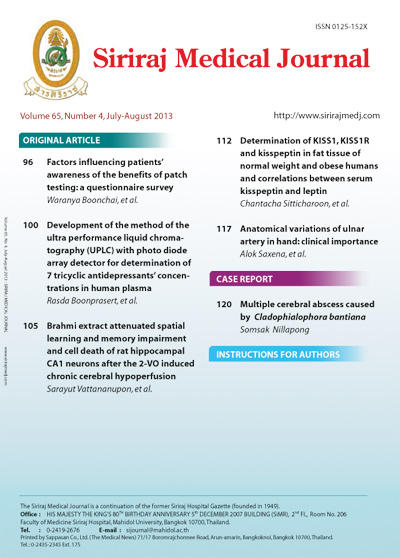Brahmi Extract Attenuated Spatial Learning and Memory Impairment and Cell Death of Rat Hippocampal CA1 Neurons after the 2-VO Induced Chronic Cerebral Hypoperfusion
Keywords:
Cerebral hypoperfusion, Brahmi, common carotid artery ligation, 2-VO, Hippocampus, CA1Abstract
Background: Vascular dementia, a learning and memory afflicted disease, is caused by chronic cerebral hypoperfusion which leads to neuronal injury and death. Brahmi extract is used in Indian Ayurvedic medicine to enhance learning and memory and to promote brain functions.
Objective: To examine the therapeutic potential of Brahmi extract as an alternative treatment for vascular dementia in the rat model of chronic cerebral hypoperfusion.
Methods: The chronic cerebral hypoperfusion was induced by permanent bilateral common carotid artery occlusion (2-VO), causing vascular dementia. After the occlusion, Brahmi extract was given for 2 months, and the spatial learning and memory tests were then performed after 2 months of drug administration. At the end, all animals were sacrificed, and the brains were removed for histological examination and counting of the hippocampal CA1 neurons.
Results: The 2-VO induced cerebral hypoperfusion reduced the hippocampal CA1 neuron count and impaired the spatial learning and memory. Brahmi extract, on the other hand, could attenuate the memory deficit and neuronal reduction.
Conclusion: Brahmi extract attenuated the deficit induced by the permanent bilateral common carotid artery occlusion, suggesting the neuroprotective effects of Brahmi extract against the cerebral hypoperfusion.
Downloads
Published
How to Cite
Issue
Section
License
Authors who publish with this journal agree to the following conditions:
Copyright Transfer
In submitting a manuscript, the authors acknowledge that the work will become the copyrighted property of Siriraj Medical Journal upon publication.
License
Articles are licensed under a Creative Commons Attribution-NonCommercial-NoDerivatives 4.0 International License (CC BY-NC-ND 4.0). This license allows for the sharing of the work for non-commercial purposes with proper attribution to the authors and the journal. However, it does not permit modifications or the creation of derivative works.
Sharing and Access
Authors are encouraged to share their article on their personal or institutional websites and through other non-commercial platforms. Doing so can increase readership and citations.











